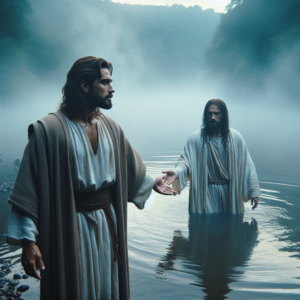Spiritual Devotional about Spirituality vs. Religion
Spirituality vs. Religion: A Journey towards Enlightenment

We live in a world where the words spirituality and religion are often used interchangeably, yet they draw distinct lines that separate them and also several similarities that bind them together. The concept of spirituality and religion is vast and varied. So, let’s step into this untrodden path to explore these profound terms.
Religion: A Structured Path
Religion, as described in the Bible, is a path laden with structured beliefs, rituals, and ceremonies that provide a systematic approach towards understanding divinity. Pulling a quote from the Book of James, “Religion that God our Father accepts as pure and faultless is this: to look after orphans and widows in their distress and to keep oneself from being polluted by the world (James 1:27).” Religion, according to the scriptures, is essentially a call to live a noble and moral life.
Spirituality: A Personal Quest
Spirituality connotes a personal quest to decipher the meaning of life, death, and the universe beyond our physical existence. It’s about exploring the depth of your own soul and seeking harmony with the divine. As the Apostle Paul wrote, “For we live by believing and not by seeing.” (2 Corinthians 5:7). This verse elegantly encapsulates the essence of spirituality: a leap of faith.
The Intersection of Spirituality and Religion
Revisiting the biblical tale of the Prodigal Son, we can find an intersection between spirituality and religion. The prodigal son’s return to his father (Luke 15:11-32), reflects religion’s principles of sin, repentance, and forgiveness. However, his journey, self-realization, and transformation echo the spiritual quest for personal growth and enlightenment. It’s essential to understand that spirituality and religion can coexist beautifully, complementing each other in our search for the divine connection.
Embracing Both: A Balanced Approach
Spirituality or religion, neither has to be restrictive. It’s like two different paths leading to the same mountain peak. The Book of Romans quotes, “For the kingdom of God is not a matter of eating and drinking, but of righteousness, peace, and joy in the Holy Spirit (Romans 14:17).” Here, Apostle Paul emphasizes the profoundness of spirituality in religious practices. Therefore, embracing both spirituality and religion could potentially lead to a balanced approach to experiencing divinity.
Remember, at the end of the day, whether you choose the path of spirituality, religion, or both, the ultimate goal remains the same: to love, serve, and connect with the divine, as expressed succinctly in the Bible, “And now these three remain: faith, hope, and love. But the greatest of these is love (1 Corinthians 13:13).”
Conclusion
Engage in a journey of self-discovery, immersing your soul in the love and wisdom that the path of spirituality and religion offers. Foster an open heart, seek the divine in your unique way, and cherish the divine connections you encounter along your path.
Until next time, may your journey be full of boundless love, profound wisdom, and endless grace!
Explore and dig up answers yourself with our BGodInspired Bible Tools! Be careful – each interaction is like a new treasure hunt… you can get lost for hours 🙂
Q&A about Spirituality vs. Religion
Q: What is the core difference between spirituality and religion?
A: Spirituality is usually understood as a personal, self-guided connection to a higher power or cosmic truth, often seeking inner peace and self-development. On the other hand, religion typically involves organised beliefs and practices shared among a community, often centered around a deity or deities whose teachings guide individual behaviour and thought.
Q: Can a person be spiritual but not religious?
A: Yes, many people identify as “spiritual but not religious”. They feel a connection to a higher power and may engage in spiritual practices such as meditation or reflection, but they do not subscribe to specific religious doctrines or participate in organised religion.
Q: Is it necessary to follow a religion to be spiritual?
A: No, spirituality is often independent of religion. While religions usually have spiritual elements in them, one can be spiritual without adhering to a particular religion.
Q: Can you follow a religion without being spiritual?
A: While religion traditionally incorporates spiritual practices and seek to answer larger existential questions, it is theoretically possible for someone to follow religious practices, rituals, and community involvement without having a deeper spiritual understanding or connection.
Q: Does spirituality or religion have rules?
A: Spirituality typically does not have rules, it is a personal and subjective pursuit. In contrast, religions often have doctrines, sacred texts, or rules that followers are expected to abide by.
Q: How can a person choose between spirituality and religion?
A: The choice between spirituality and religion is a personal one, often influenced by one’s upbringing, personal experiences, and introspection. Some people may find deep community and moral guidance from religion, while others may find personal peace and self-discipline through individual spirituality.
Q: Can one be both spiritual and religious?
A: Yes, there often is an overlap between spirituality and religion. Many religious people incorporate personal spiritual practices into their lives, while also participating in the communal and structural elements of their respective religions.


